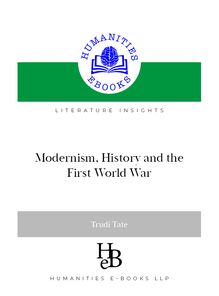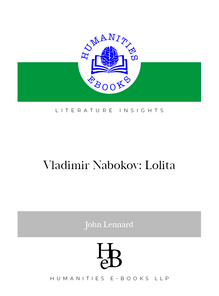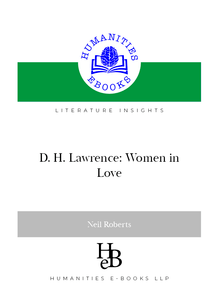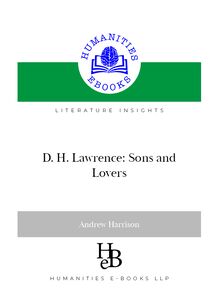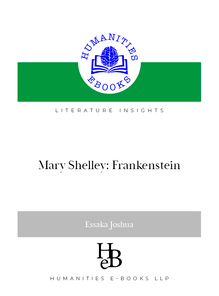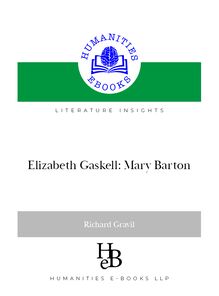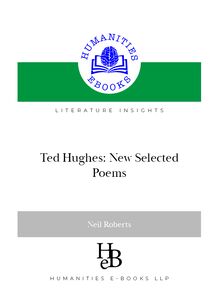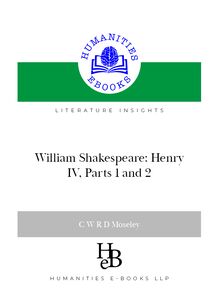-
 Univers
Univers
-
 Ebooks
Ebooks
-
 Livres audio
Livres audio
-
 Presse
Presse
-
 Podcasts
Podcasts
-
 BD
BD
-
 Documents
Documents
-
- Cours
- Révisions
- Ressources pédagogiques
- Sciences de l’éducation
- Manuels scolaires
- Langues
- Travaux de classe
- Annales de BEP
- Etudes supérieures
- Maternelle et primaire
- Fiches de lecture
- Orientation scolaire
- Méthodologie
- Corrigés de devoir
- Annales d’examens et concours
- Annales du bac
- Annales du brevet
- Rapports de stage
La lecture à portée de main
204 pages
English
Découvre YouScribe en t'inscrivant gratuitement
Je m'inscrisDécouvre YouScribe en t'inscrivant gratuitement
Je m'inscris
Obtenez un accès à la bibliothèque pour le consulter en ligne
En savoir plus
En savoir plus
204 pages
English
Obtenez un accès à la bibliothèque pour le consulter en ligne
En savoir plus
En savoir plus

Description
MODERNISM HISTORY and the FIRST WORLD WAR Trudi Tate Using this Ebookt *7KLV ERRN LV GHVLJQHG WR EH UHDG LQ VLQJOH SDJH YLHZ XVLQJ WKH µ¿W page’ command. *To navigate through the contents use the hyperlinked ‘Bookmarks’ at the left of the screen. *To search, click the search symbol. *For ease of reading, use to enlarge the page to full screen, and return to normal view using . *Hyperlinks (if any) appear in Blue Underlined Text. Permissions Your purchase of this ebook licenses you to read this work on-screen. You may print a copy of the book for your own use but copy and paste functions are disabled. No part of this publication may be otherwise reproduced or transmitted or distributed without the prior written permission of both the copyright owner and the publisher. This work is copyright. Making or distributing copies of this book would constitute copyright infringement and would be liable to prosecution. Thank you for respecting the rights of the author. Frontispiece: Beatty and Babs, after investing £1,300 at the Chiswick Tank, sang a songwhich was greatly appreciated. Reproduced courtesy of the Trustees of the Imperial War Museum, London. Crown copyright. Modernism, History and the First World War Trudi Tate HEB ʏ Humanities-Ebooks © 1998, 2013, Trudi Tate 7KH $XWKRU KDV DVVHUWHG KHU ULJKW WR EH LGHQWL¿HG DV WKH DXWKRU RI WKLV :RUN in accordance with the Copyright, Designs and Patents Act 1988.
Sujets
Informations
| Publié par | Humanities eBooks |
| Date de parution | 11 janvier 2021 |
| Nombre de lectures | 1 |
| EAN13 | 9781847602398 |
| Langue | English |
| Poids de l'ouvrage | 3 Mo |
Informations légales : prix de location à la page 0,0498€. Cette information est donnée uniquement à titre indicatif conformément à la législation en vigueur.
Extrait
MODERNISM HISTORY and theFIRST WORLD WAR
Trudi Tate
Using this Ebookt
*This book is designed to be read in single page view, using the ‘ît page’ command. *To navigate through the contents use the hyperlinked ‘Bookmarks’ at the left of the screen. *To search, click the search symbol. *For ease of reading, use <CTRL+L> to enlarge the page to full screen, and return to normal view using < Esc >. *Hyperlinks (if any) appear in Blue Underlined Text.
Permissions
Your purchase of this ebook licenses you to read this work on-screen.
You may print a copy of the book for your own use but copy and paste functions are disabled.
No part of this publication may be otherwise reproduced or transmitted or distributed without the prior written permission of both the copyright owner and the publisher.
This work is copyright. Making or distributing copies of this book would constitute copyright infringement and would be liable to prosecution.
Thank you for respecting the rights of the author.
Frontispiece: Beatty and Babs, after investing £1,300 at the Chiswick Tank, sang a song which was greatly appreciated. Reproduced courtesy of the Trustees of the Imperial War Museum, London. Crown copyright.
Modernism, History
and the First World War
Trudi Tate
HEB☼HumanitiesEbooks
© 1998, 2013, Trudi Tate
The Author has asserted her right to be identiîed as the author of this Work in accordance with the Copyright, Designs and Patents Act 1988.
First published by Manchester University Press 1998. Second edition published in 2013 by Humanities-Ebooks, LLP Tirril Hall, Tirril, Penrith CA10 2JE.
This book is available in Kindle format from Amazon, in paperback from Lulu.com, and as a Library PDF Ebook (with word and phrase search and higher resolution images) from MyiLibrary, EBSCO and Ebrary to librarians. The PDF is available to individuals exclusively fromhttp://www.humanities-ebooks.co.uk.
ISBN 9781847602398 PDF ISBN 9781847602404 Paperback ISBN 9781847602411 Kindle
6
Contents
Acknowledgements Introduction
I. Witness to war
1. War neurotics The sinking of the Lusitania HD’s war îction Kipling, ‘Mary Postgate’ 2. Propaganda lies Atrocity stories Propaganda exposed Rumour in Parade’s End
II. Corporeal fantasies
3. Vile bodies Body politics: Barbusse, Under Fire Repression and fascination: Blunden, Undertones of War Bodies in pieces These men were men Dead women Bodies in the earth The violence of Melanie Klein 4. Visible differences Sexual difference: theories of the visible Soldiers in Lawrence Lawrence, ‘The Blind Man’ Faulkner, Soldiers’ Pay
8 10
1
8
19 26 29 41 51 53 56 60
7
4
75 81 87 89 93 97 100 103
109 111 115 117 123
Modernism, History and the First World War
III. War and politics
5. The tank and the manufacture of consent Tank banks From Little Willie to Mother Tank writing Wilfred Bion 6. Mrs Dallowayand the Armenian Question Postwar satire The Armenian Question The Prime Minister Select bibliography
7
132
133 140 146 151 156 160 164 167 172 183
Acknowledgements
For the Irst edition, 1998
Many people have assisted me in the writing of this book. I am particularly grateful to Gillian Beer for her generous advice throughout the project and to Maud Ellmann for her encouragement and support. Thanks are due to Sue Cheshire, David Dickinson, Ian Donaldson, David Glover, Mary Hammond, Mike Hammond, Mary Jacobus, John Kerrigan, Vasant Kumar, Sarah Meer, Rod Mengham, Mark Micale, Peter Middleton, Ian Patterson, Lawrence Rainey, Suzanne Raitt, Karen Seymour, Helen Small, Hugh Stevens, John Tate, Toni Tate, Gill Thomas, Pam Thurschwell, David Trotter, the late Stephen Wall, and Jay Winter for comments and advice. The Modernism Seminar at the Centre for English Studies, London, has been a constant source of inspiration and debate; thanks to Claire Buck, Carolyn Burdett, Rebecca Dawson, Geoffrey Gilbert, and Lyndsey Stonebridge. The book could not have been completed without the intellectual support and warm generosity of Con Coroneos. The staff of the University Library and English Faculty Library, Cambridge; the National Library of Scotland, Edinburgh; the Hartley Library, University of Southampton; and the Imperial War Museum photographic department have been unfailingly courteous and help-ful. Darwin College, Cambridge, and the Universities of Edinburgh and Southampton provide înancial help with my research, and Clare Hall, Cambridge, provided me with a Visiting Fellowship and a lively environment in which to complete the writing in 1997. Portions of chapter 1 were published in Sarah Sceats and Gail Cunningham, eds,Image and Power(London: Longman, 1996) and in Suzanne Raitt and Trudi Tate, eds,Women’s Fiction of the Great War(Oxford: Clarendon, 1997); a version of chapter 2 appeared inEssays in Criticism(1997); parts of chapter 5 were published inModernism/ Modernity(1997) andWomen: A Cultural Review(1997); a version
Modernism, History and the First World War
9
of chapter 6 was published inTextual Practice (1994). Permission to reproduce the cover image and the plates in chapter 5 was kindly granted by the Trustees of the Imperial War Museum, London.
For the second edition, 2013
Thanks to colleagues and students at Clare Hall, where I was elected a Fellow in 2001, and to the Faculty of English, Cambridge, for their bright and supportive intellectual environments. Colleagues and students in the Institute for English and American Studies at the J. W. Goethe University, Frankfurt, provided insightful comments on this work; thanks to Daniel Dornhofer, Astrid Erll, Klaus Hofmann, Stefanie Lotz, and Harald Raykowski. Thanks also to Gillian Beer, Evelyn Chan, Santanu Das, Alison Hennegan, Alex Houen, Jane Potter, Hugh Stevens, and Bobbie Wells for continuing conversations and wise advice. I am particularly grateful to Irene Hills and Klaus Hofmann for their kind help in preparing this second edition of the book. Finally, heartfelt thanks to Rosa Tate for making it all worthwhile.
Permission to reproduce the cover image and the plates in chapter 5 was kindly granted by the Trustees of the Imperial War Museum, London.
Introduction
In a scene excised fromThe Years(1937), Virginia Woolf describes a group of passengers sitting on the London Tube in 1914, desperate for news of the war. ‘Three British Cruisers Sunk’, they read, and they scramble through the newspaper, looking for more information. But there is no more news, only ‘items’: triplets born, strawberries 1 picked, ‘that was all’.Twenty years after the event, Woolf remembers the First World War as a time of darkness and silence in which no one, including the combatants, knew what was going on nor why they 2 were involved. Whole nations found themselves bearing witness to events they did not understand and, by and large, could not see. Writing in 1915, Freud remarked that he was standing too close to 3 the war to see it properly. As time passed, many writers struggled to express what they had seen—or not seen—in the event that was to shape the history of the entire twentieth century. This is a study of the relationship between modernist îction, the First World War, and cultural history. It explores the ways in which writing attempted to bear witness to the trauma of the war and its consequences. All the works I will discuss are concerned with the distinction between witnessing and seeing, and they worry about how one is placed in relation to a history one has lived through and not seen, or seen only partially, through a fog of ignorance, fear, confu-4 sion, and lies. This question troubled combatants as well as civil-
1 Woolf, material excised from the galley proofs ofThe Years (1937), rpt in the appendix toThe Years, ed. Hermione Lee (Oxford: Oxford University Press, 1992), 418. See also Anna Snaith’s annotated edition ofThe Years(Cambridge: Cambridge University Press, 2012). 2 Woolf,The Years, 266. 3 Freud, ‘Thoughts for the Time on War and Death’ (1915), Pelican Freud Library, 12,Civilization, Society and Religion(Harmondsworth: Penguin, 1985), 61. 4 Referring to the trauma of Nazism, Shoshana Felman argues that ‘our era [is] an age of testimony, an age in which witnessing itself has undergone a major
-
 Univers
Univers
-
 Ebooks
Ebooks
-
 Livres audio
Livres audio
-
 Presse
Presse
-
 Podcasts
Podcasts
-
 BD
BD
-
 Documents
Documents
-
Jeunesse
-
Littérature
-
Ressources professionnelles
-
Santé et bien-être
-
Savoirs
-
Education
-
Loisirs et hobbies
-
Art, musique et cinéma
-
Actualité et débat de société
-
Jeunesse
-
Littérature
-
Ressources professionnelles
-
Santé et bien-être
-
Savoirs
-
Education
-
Loisirs et hobbies
-
Art, musique et cinéma
-
Actualité et débat de société
-
Actualités
-
Lifestyle
-
Presse jeunesse
-
Presse professionnelle
-
Pratique
-
Presse sportive
-
Presse internationale
-
Culture & Médias
-
Action et Aventures
-
Science-fiction et Fantasy
-
Société
-
Jeunesse
-
Littérature
-
Ressources professionnelles
-
Santé et bien-être
-
Savoirs
-
Education
-
Loisirs et hobbies
-
Art, musique et cinéma
-
Actualité et débat de société
- Cours
- Révisions
- Ressources pédagogiques
- Sciences de l’éducation
- Manuels scolaires
- Langues
- Travaux de classe
- Annales de BEP
- Etudes supérieures
- Maternelle et primaire
- Fiches de lecture
- Orientation scolaire
- Méthodologie
- Corrigés de devoir
- Annales d’examens et concours
- Annales du bac
- Annales du brevet
- Rapports de stage
Signaler un problème
YouScribe
Le catalogue
Le service
© 2010-2024 YouScribe
